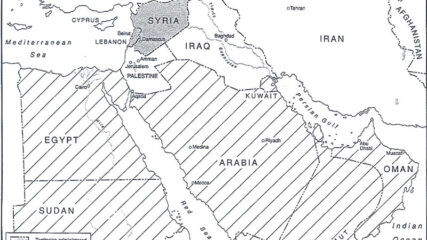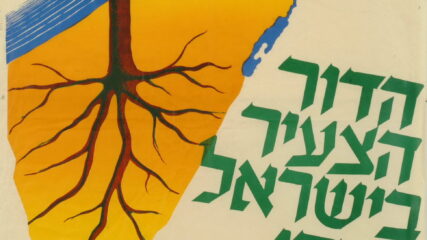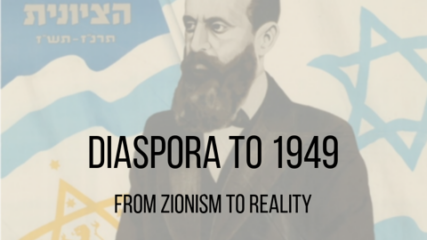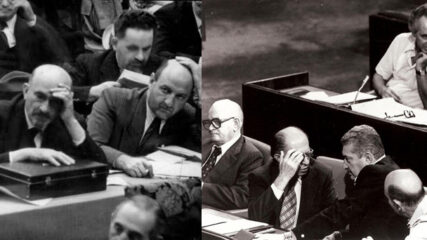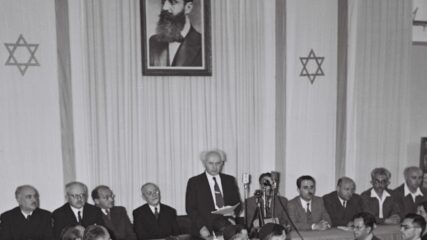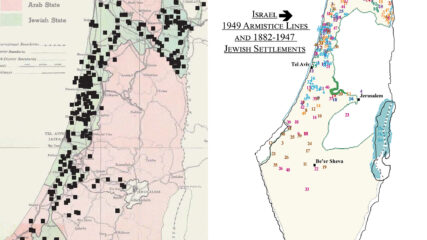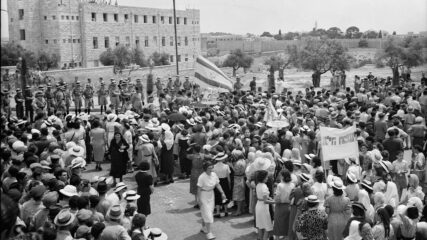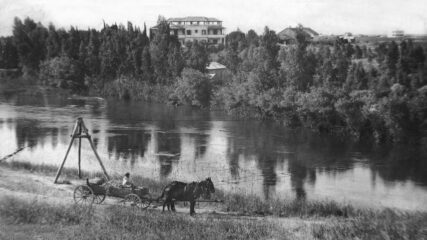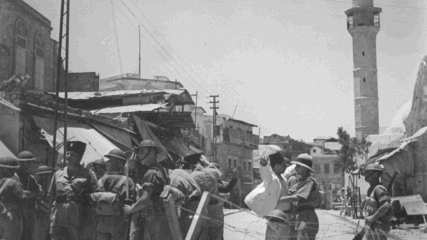August 1914
This map shows the Ottoman Empire’s administrative districts before World War I broke out in August 1914 in areas that today are Israel, Gaza, the West Bank, Lebanon, Jordan, Syria and part of Iraq.
1890s
The area of Eretz Yisrael was part of the Ottoman Empire and composed of three large administrative areas without any political identity as a state or part of a state. At times, portions of the area that was later designated as the Palestine Mandate were ruled from Mecca, Damascus, or Baghdad, or in the case of Jerusalem, directly from Istanbul.
1937
Stein, Kenneth W. The Land Question in Palestine, 1917-1939. North Carolina: University of North Carolina Press, 1984 and 2003. Copyright, Ken Stein and the Center for Israel Education, 2024.
March 20, 2022
Recorded March 20, 2022, this 33-minute presentation by Center for Israel Education President Ken Stein addresses how teachers’ decisions on when in history to begin the story of Israel alter what students learn about Zionism, the State of Israel and the Jewish people’s connection to the land.
February 14, 1896
Eventual founding leader of the World Zionist Organization Theodor Herzl says a Jewish state is need in response to antisemitism.
August 29, 1897
Max Nordau's impassioned speech summarizes the unique Jewish identity of belief, Torah, ritual and community. With those central elements as a people, their state of impoverishment and wretched physical insecurity, he argues, are vital for rebuilding the Jewish national territory.
November 2, 1917
The British Foreign Ministry promises to work toward a Jewish national home in Palestine with no harm to non-Jewish populations or to Jews living elsewhere who might want to support a Jewish home.
April 26, 1920
The European agreement that identified the states of the Middle East, 1920.
April 2, 1920
Herbert Samuel, soon to serve as Britain's first high commissioner for Palestine and the only Jew to hold the role, notes reasons for Arab political infighting, the origins of Arab dislike of Zionism, how land sales to Jews generate Arab jealousies, Jewish educational focus and the potential of the region of Palestine to support 4 million people.
1921
As shown in this map, the British in 1921 separated a new emirate, Transjordan, from what officially became the Mandate for Palestine the next year. The British officially maintained political and military control of both...
July 1922
With intentioned ambiguity, Britain asserts that its goal in Palestine is not to make it wholly Jewish or subordinate the Arab population. Self-determination is not promised. Britain wants to remain an umpire between the communities. Naively, it thinks it can control communal expectations and keep the peace.
July 24, 1922
International legitimacy is granted to establish a Jewish National Home in Palestine. Rules for its establishment clearly give Jews in Palestine distinct advantages over the local Arab population.
January 17, 1930
Palestine's High Commissioner Chancellor seeks to halt the Jewish National Home in favor of the Arabs. He fails to overcome the Zionist drive and Arab unwillingness to cooperate with his intentions.
1930
Jewish land acquisition in 1930 mostly in the valley and coastal regions.
November 18, 1931
An invaluable glimpse at Palestine's population: gaping socio-economic distances and vast communal differences between Muslims, Christians and Jews that set the strong preferences for separation of the populations.
March 28, 1932
The first Maccabiah Games, an international Jewish Olympics, open in Tel Aviv.
1973
By Yehoshua Porath, 1973 Historian Yehoshua Porath wrote “Social Aspects of the Emergence of the Palestinian Arab National Movement” as a chapter for the book Society and Political Structure in the Arab World, Menachem Milson...
January 10, 1936
Five Arab political parties sent a memorandum of protest to the British asking for a halt to Jewish immigration, a stoppage in Arab land sales to Jews,and a measure of self-determination. The British did not change their policies in these three areas. In 1939, they did severely limit Jewish land purchases and severely curtailed Jewish immigration.
January 7, 1937
Ben-Gurion recognized that Arab opposition to Zionism is a national feeling and that Palestinian Arab leadership had done little to help the majority impoverished peasant population.
December 31, 1937
With more Arab sale offers than funds for purchases, Zionist leaders decide on strategic priorities and designate areas around Haifa, Jerusalem-Jaffa road, and the Galilee near headwaters of the
Jordan River.
July 7, 1937
After outbreak of communal violence, the British investigatory committee suggests partition of Palestine, seeking to create two states for two peoples.
September 30, 1938
This document was secured at the Central Zionist Archives in Jerusalem. Less than a year before Hitler invaded Poland, Arab leaders with an interest in Palestine are starkly disappointed that the the German government did not go to war against the Zionists in Palestine. The same leaders give the Zionist national builders high marks for their perseverance against terrorist bands in the Palestinian countryside. They worry that unless Arab states come to the Palestinians’ assistance, Palestine will be lost to the Zionists. A remarkable assessment for Palestinian Arab leaders and their supporters.
January 20, 1939
A description details the economic devastation caused by the 1936-1939 Arab disturbances in Palestine to the majority rural population. This followed the annually poor crop yields of the early 1930s, and the vast rural wreckage caused by WWI.
March 1939
Mufti opposes Arab majority state in ten years contrary to wishes of a dozen key other Palestinian leaders. Mufti wants no Jewish political presence in Palestine whatsoever.
1920s-1948
The Palestinian Arab elite chose to boycott in virtually all British and U.N. overtures to them from 1920 to 1948, with egregious consequences. The Palestinian Arab elite shunned British officials who were staunch supporters of...
May 23, 1939
Zionist leaders—David Ben-Gurion, Chaim Weizmann and Eliezer Kaplan—learning of the British intent to limit severely the Jewish national home’s growth. Increasingly, they are also aware of the German government’s hostilities towards European Jewry.
1931-1949
Palestinian Arabs' own words, backed by the observations of British and Zionist officials, show that their awareness that their own people were helping the Zionist causes through land sales, often displacing Arab peasants.
May 11, 1942
In New York, urging American (Jewish) support, Ben-Gurion proclaims the eventual establishment of a Jewish state.
July 17, 1944
Before ending his term in 1944 as Palestine's High Commissioner, Sir Harold MacMichael suggested the partition of Palestine, "Jews and Arabs alike would enjoy the possession of their own respective territories, the former protected by international guarantees for their security, and the latter relieved from fear of further encroachments."
December 25, 2022
In this 46-minute video recorded Dec. 25, 2022, two emeritus professors from the Hebrew University of Jerusalem joined President Ken Stein to discuss the key period when the Zionists succeeded in creating and securing a...
September 17, 1947
The head of Arab League says Palestine may be lost in a confrontation with the Zionists, but emphatically states that war is the Arab’s only option.
March 1946
From the beginning of the Palestine Mandate in 1920, Arabs in Palestine opposed Zionism; Arab states and leaders joined the opposition to Zionism in the 1930s. After WWII, Arab states were vehement in their opposition to Zionism, though the merits of their arguments were genuine, Arab leaders were more interested in controlling the land of Palestine than in the Palestinians themselves.
August 31, 1947
Earlier in 1947, Great Britain turned the future of the Palestine Mandate over to the newly established United Nations. Then in August 1947, the UN suggested that establishing an Arab and Jewish state with a federal union would be the best solution for the communal unrest there.
November 29, 1947
The UN recommended establishing Arab and Jewish states in Palestine, with an international regime for Jerusalem. Zionists were jubilant; Arab states and the Palestinians were indignant and rejected two state solution. No Arab state is established, Israel is in 1948
June 19, 1947
The Status-Quo Agreement is an understanding reached between David Ben-Gurion, then the chairman of the Jewish Agency Executive, and the religious parties in the period before Israel became a state.
May 14, 1948
In the months before the UN vote to partition Palestine into Arab and Jewish states in November 1947, the Jewish Agency leadership there had to overcome a series of foreign policy obstacles working against the Jewish state’s establishment.
May 1948-March 1949
Otherwise known as Israel’s War of Independence, or, “the nakbah” or disaster to the Arab world because a Jewish state was established, the war was fought between the newly established Jewish state of Israel opposed by Palestinian irregulars, and armies from five Arab states. Official beginning of the war is usually given as May 14, 1948, the date Israel declared itself an independent Jewish state, but the war’s first of four phases began in November 1947. Lasting for two years, the war ended with armistice agreements signed in 1949 between Israel and four Arab states.
1945-1949
Steady disintegration of Palestinian Arab society from 1945-1949 is detailed by five Arab and non-Arab historians citing local social cleavages, economic impoverishment, fear, indebtedness, and political dysfunction.
February 24, 1949
One of four agreements Israel signed in 1949 with Arab neighbors, it does not end the state of war between Israel and Egypt. They do not sign a treaty until 1979.
Spring 1949
The area of Israel expanded and the potential area for a Palestinian Arab state decreased because of the 1948-49 war, Israel’s War of Independence. The Arab rejection of the 1947 U.N. partition plan thus hurt...
March 14, 2022
Reprinted with permission from the author. Dr. Avraham Sela’s survey is unique for its breadth and analytical candor. He analyzes Arab authors, country by country who wrote about the 1948 Arab loss of Palestine. Sela...
June 7, 2024
Musa Alami, “The Lesson of Palestine,” Middle East Journal, Volume 3, No. 4, October 1949, pp. 373-405 Reprinted with permission of The Middle East Institute, October 2021 In this 1949 article published in Middle East...
June 13, 2021
Compiled by Dr. Ken Stein, June 2021 These sources and references unfold the history of the Jewish state through 1949, from state-seeking to state-making to state-keeping.
May 15, 1948
This 10-page report, written by the British Colonial and Foreign Office, along with the
1937 Peel (Royal) Commission Report, is one of the two best summaries of the British presence in Palestine. Both are substantial in terms of content, detail and analyses; both were written from Britain’s perspective. Read these along with
1931 Census for Palestine to have a fuller grasp of the politics and the populations that shaped Britain’s Palestine’s administration from 1918-1948.
1944-1945
Gerda Luft's, "Cultural Life in Palestine," is representative of the dozens of excellent analyses of Jewish life and politics in Palestine/Israel and the world located in the annual Palestine Yearbooks, later the Israel Yearbook, published from 1945 forward.
May 7, 2023
May 7, 2023 In a 32-minute presentation recorded during the second hour of our special two-hour Israel@75 webinar and Teen Israel Leadership Institute session May 7, 2023, Adina Karpuj, a podcast producer for Israel Story who lives in Jerusalem, talks...
1951
Celebrating the creation and survival of the State of Israel, the yearbook provides a thorough history of the Zionist movement from the First Zionist Congress in 1897 to independence in 1948.
1952
With crisp analysis, Haganah Commander Yigal Allon, later a Prime Minister of Israel attributes Israel's successes to multiple factors including the absence of a centralized Arab command, limited Arab military training, underestimating the potential fighting capabilities of local Arabs, and Israel's success in integrating its citizens into the war effort.
February 6, 2023
Adopting a systematic, yet non-technical, approach, Jacob Metzer's book is the first to analyze the divided economy of Mandatory Palestine from the viewpoints of modern economic history and development economics.
December 28, 2022
Examination of the mobilization of society for the Israeli War of Independence effort enables one to present a more extended process that began in October 1947 — some two months prior to the outbreak of the war — and ended, from the standpoint of mobilization of personnel, at the beginning of 1949, when demobilization of the first draftees from the wartime army took place, and from an economic standpoint in April 1949, when an Austerity system was declared in the State of Israel.
Spring 1948
By Bernard Wasserstein Included as a 15-page chapter in the 2019 book Serendipitous Adventures With Britannia: Personalities, Politics and Culture in Britain, edited by Wm. Roger Louis and used with permission, this overview of the...



